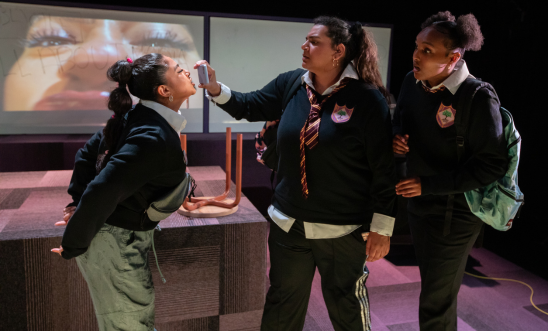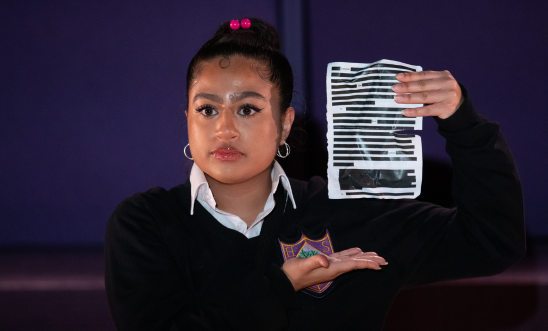
A political awakening: new play on "Prevent"

Article appeared first in the Amnesty Magazine.
Sonali Bhattacharyya’s play Liberation Squares examines the dystopian effect of Prevent, the UK government’s strategy ‘to stop people becoming terrorists’, which disproportionately targets Muslims.
The playwright drew on Amnesty’s recent report, This is the Thought Police, which revealed the vast majority of people targeted by Prevent present no threat and called for the strategy to be scrapped.
Sonali Bhattacharyya explains why she wanted to bring this issue to theatre audiences:
No one was really talking about Prevent, but I knew that it was having an enormous impact on people. There is potentially a big histrionic story to be told about Prevent, through the big headline moments, but I was more interested in telling the story of the quiet erosion of civil liberties. Young people are being made to feel like they’ve done something wrong. They’re not sure what they’ve done and they’re often not sure who says they’ve done something wrong. The most shocking thing I found in my research was the day-to-day nature of Prevent. You’d speak to ordinary people and they’d be like, ‘Yes, someone made a referral about me when I was at university.’
That’s what makes it so infuriating to me. Prevent really disrupts people’s lives and their education and then they’re supposed to carry on as if nothing happened and just live with that. The government can have this completely Islamophobic intervention into ordinary people’s lives. What’s being communicated to them is that you will be treated like a secondclass citizen. You’re under greater scrutiny than the next person.
I started writing Liberation Squares just before the pandemic hit. My characters are three teenage British Muslim girls. It felt important to start with these girls’ voices because the thing that’s been taken away by Prevent is the voices of young people.

It disproportionately affects teens and even younger children. That’s such a formative time, when you’re just finding your personality and how to express your agency.
The girls’ friendship was central to the play and it felt important that each of them had their own particular way of expressing themselves. Ruqaya is an amazing rapper and beatboxer, Sabi loves graphic novels and has this incredible imagination and Xara is an aspiring TikToker who wants to politically educate her audience. I wanted to celebrate the talent and innovation of young people. So that was the starting point. I wanted the audience to understand what Prevent is taking away from them.
I think it’s such an insidious and chilling way to try and make young people conform.
I did so many drafts of this play and I went through every possible iteration of which of the characters gets referred, who refers them, who they think refers them. I came to realise as we approached rehearsals that I wanted it to be through the lens of these teenage girls and that actually it was important that the audience never land on a definite answer because the reality is many people never find out who referred them to Prevent. They only get as far as the characters do in the play – a shortlist of possible suspects. How corrosive is that?
It’s a whodunnit without ever finding out who done it.
The play was a co-production between Nottingham Playhouse, Brixton House and Fifth Word, the brilliant production company. Then we toured cities: Coventry, Bolton, Sheffield, Birmingham, Oxford – we had such a brilliant reception everywhere. I don’t want to make Liberation Squares sound too heavy – it’s really fun. It’s a hip-hop comedy. It’s been stunning to see how people have connected with this play. We’ve had audiences in who don’t regularly feel very welcome in the theatre; lots of young black and brown people and particularly young Muslim people. We would love to bring Liberation Squares back.
Amnesty’s report on Prevent was key for the play. We talked about it in the rehearsal room and I made sure all the actors read it. We had a QR code at the end of every show so people could click and read the report. It was a really key part of our research process.
Hopefully people have a good night out, but also learn what has been going on and talk to other people and start to build a community resistance against Prevent.
One of the key things you can do as a storyteller is reflect on our shared humanity. How can we defend each other and how can we build connections with one another outside of theatre?
Sonali Bhattacharyya’s next production is King Troll (The Fawn) in which two sisters try to navigate the horrors of the border regime. The play, directed by Milli Bhatia, will be at London’s New Diorama Theatre from 4 October to 2 November. Bookings: newdiorama.com/whats-on/king-troll-the-fawn
Our blogs are written by Amnesty International staff, volunteers and other interested individuals, to encourage debate around human rights issues. They do not necessarily represent the views of Amnesty International.
0 comments